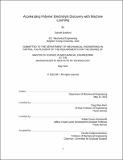Accelerating Polymer Electrolyte Discovery with Machine Learning
Author(s)
Bradford, Gabriel
DownloadThesis PDF (1.529Mb)
Advisor
Shao-Horn, Yang
Gomez-Bombarelli, Rafael
Terms of use
Metadata
Show full item recordAbstract
Solid polymer electrolytes (SPEs) have the potential to improve energy storage devices by enhancing safety and enabling higher energy densities. However, SPEs suffer from significantly lower ionic conductivity than liquid electrolytes, limiting their adoption in functional devices. To facilitate more rapid discovery of high ionic conductivity SPEs, we developed a chemistry-informed machine learning model that accurately predicts ionic conductivity of SPEs. To train the model, we compiled training data of SPE ionic conductivity from hundreds of experimental publications. Our chemistry-informed model incorporates Arrhenius behavior into a state-of-the-art message passing neural network and has significantly improved accuracy over models with no explicit chemistry encoded. This method of tailoring a model to a specific prediction task by incorporating known chemical physics would be applicable to other materials discovery tasks and would be especially helpful where limited training data are available. Using our fully trained model, ionic conductivity values were predicted for several thousand candidate SPE formulations, allowing us to identify promising candidate SPEs. We also generated predictions for several different anions in two commonly used polymers, allowing us to examine the role of the anion in ionic conductivity.
Date issued
2022-05Department
Massachusetts Institute of Technology. Department of Mechanical EngineeringPublisher
Massachusetts Institute of Technology